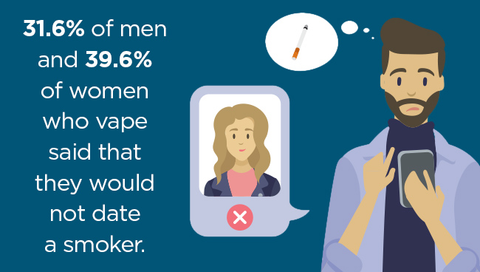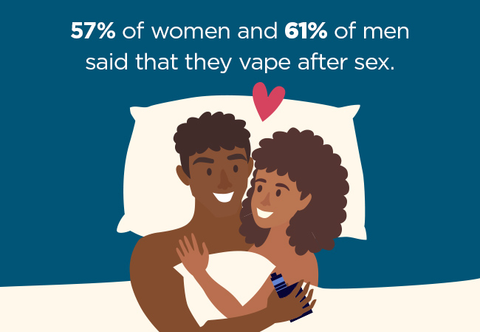
Many years ago, when I was working in Indonesia, I met a girl.
Despite some initial language barriers the conversation was going well until I reached for a cigarette.
“I don’t like men who smoke,” she told me.
Fortunately she made an exception for me and, with her encouragement, I eventually quit smoking. We’re still together 22 years later. (We’re also a lot better at each others’ language!)
I was lucky. A number of polls over the years suggest my wife is not the only person who dislikes people who smoke and that many non-smokers are reluctant to date smokers. That’s no surprise. For decades there has been a deliberate policy of ‘denormalising’ smoking – which, in addition to truths about the real harms of smoking, has often exaggerated the harm to non-smokers with concepts such as third-hand smoke.
But what about vapers? Is vaping also unattractive, or does switching to vaping increase your chances of a successful romantic relationship?
There’s little data available, so we sent a survey to our subscribers, and nearly 2000 of them responded, but here’s some of the key findings.
Vaping has little impact on dating success
Only 53 people said they had been turned down for a date because they vaped. That sounds like a lot, but 944 of our respondents said they had never had a problem. (Obviously, not all of our respondents have been in the dating game since they started vaping, and indeed 928 said the question was not relevant.) Only 45 (2.3%) people had been turned down for a second date or dumped because of vaping.
It’s hard to find a direct comparison with smokers for our survey, but there’s data to show that there are bigger challenges for existing smokers. For example, a 2014 Pfizer survey found that nearly 9 out of 10 non-smokers would turn down a date with a smoker while a Department of Health survey found, rather more conservatively, that half of 1700 people would think seriously before starting a relationship with a smoker.
Would vapers date a smoker?

Given that the vast majority of vapers are ex-smokers, I was surprised that 680 of our respondents (39.6% of female vapers, 31.6% of male vapers) said they would not date a smoker.
There are a couple of potential reasons for this. We know that when people who vape have to use smoking shelters they are more likely to return to smoking. After all, smoking, which is more addictive than vaping, can remain a strong temptation even after switching to vaping.
It’s possible that smokers are taking a protective stance to prevent themselves from relapse. It’s also possible that there has been an identity change, with people identifying themselves as vapers rather than smokers.
Relationship influences on vaping habits
Over 10% of our respondents said they had taken up vaping because of their partners. As almost all vapers are ex-smokers, this is significant, because it shows that partners who vape can have a significant influence on smokers’ behaviour.
Vaping after sex

There’s few smokes that match the post-coital cigarette – but what about vaping? Almost 60% of our respondents replied that they at least sometimes vape after sex.
This may seem more light-hearted than the rest of the survey, but it does prove something serious – that vaping can help replace smoking even in novel situations!
Why does it all matter?
There’s a whole bunch of respected organisations in the UK, from the Royal College of Physicians to Public Health England (now the UK Health Security Agency and Office for Health Improvement and Disparities) who tell us that vaping is 95% safer than smoking – yet millions of people in the UK still smoke.
There are numerous reasons for this (as Professor Giovanni Li Volti pointed out recently, the number one is misinformation) but anything we can do to make the case for vaping can help. Vapers have been advised to switch to vaping for health and financial reasons – perhaps it’s time to add love to the mix!
